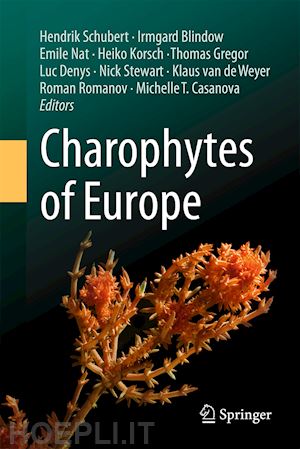Hendrik Schubert is Professor for Aquatic Ecology at the University of Rostock, Germany. His research interest are brackish water ecology with a focus on ecophysiology of autotrophs and biogeography of aquatic macrophytes, exploiting their potential for bioindication of the ecological status of aquatic ecosystems. He taught aquatic ecology at the Universities of Greifswald and Rostock.
Irmgard Blindow is Professor for Ecology at the University of Greifswald, Germany. Her main research interest are shallow freshwater and brackish water ecosystems with a focus on trophic interactions and submerged vegetation, often connected to applied issues such as eutrophication and climate change. She worked as limnologist at the University of Lund, Sweden. Today, she is the head of the Biological Station on the island of Hiddensee and teaches aquatic ecology at the University of Greifswald.
Michelle Casanova has worked at the Natural History Museum in London, the Royal Botanic Gardens in Melbourne and is currently a visiting Professor at the Cryptogamic Herbarium at the Muséum national d'Histoire naturelle, Paris. Her research interests are wetland plant ecology and management, with a focus on temporary wetlands; and family Characeae, especially Australian species and charophyte oospore variation. She provides scientific advice for catchment management and threatened species management and is the Convenor of the Scientific Advisory Group for the state of Victoria, Australia
Luc Denys is a senior researcher at the Research Institute for Nature and Forest of the Flemish government (Belgium), working primarily on the ecology and conservation status of lentic freshwater habitats, ponds and invasive aquatic species in support of environmental and biodiversity policy. His main research interests lie with macrophytes, including charophytes, and diatoms.
Thomas Gregor is senior research assistant at Senckenberg Research Institute and Natural History Museum in Frankfurt/Main, Germany. His research interest are distribution and ecology of Higher Plants and Charophytes in Central Europe, nature conservation and nomenclature. He is active in several botanical organisations and editor of botanical magazines.
Heiko Korsch is a self-employed biologist with former employments at the universities of Halle and Jena and the “Thuringian state office for mining, environment and nature protection”. His main objects are habitats, distribution of Higher Plants and Charophytes as well as nature protection. He is author or editor of many publications on these subjects.
Emile Nat is a freshwater ecologist who has founded the Dutch Information Center on Charophytes in 1995. He works for regional water authorities on macrophyte monitoring projectsfor the European Water Frame Work Directive and is guest employee of Naturalis Biodiversity Center, Leiden, the Netherlands.
Roman Romanov is a freshwater botanist with main interest in taxonomy, nomenclature, flora, genetics, biogeography, ecology, and protection of charophytes.
Current research areas for his charophyte research include Eastern Europe, Northern and Central Asia, Middle East, South-Eastern Asia with focus at all year round study in the Central Mediterranean during the ongoing year.
Nick Stewart is a freelance ecologist and nature conservationist with a particular interest in aquatic ecology and especially charophytes. He has undertaken surveys of many aquatic sites in Britain and Ireland over a period of over 40 years and is also frequently involved in training in aquatic plant identification and survey methods.
Klaus van de Weyer is a freshwater ecologist and botanist. He is member of several German botanical committees (such as CEN/DIN, ICPR). Klaus is founder and managing director of the environmental consultancy lanaplan, specialising in freshwater macrophytes. Klaus has designed different assessment systems for macrophytes in riverine and lacustrine ecosystems under the Water Frame Work Directive in Germany. Klaus has published several papers concerning macrophyte identification, ecology, distribution and their threat status in Germany (www.lanaplan.de). He is a Scuba-diver and underwater photographer. Klaus has provided training courses on macrophyte ecology and identification since 2000.












